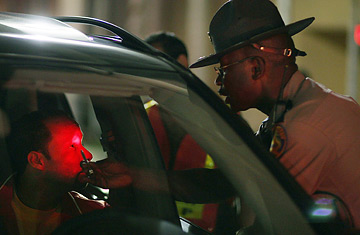
"Friends don't let friends drive drunk." Every child of the '80s remembers that ubiquitous anti-drunk-driving slogan, though it hasn't had much impact on celebrities like Lindsay Lohan, who was arrested Tuesday for the second time for driving under the influence. Now a new study shows that there's a much more direct and effective way to take drunk drivers off the road: state laws that revoke a driver's license on the spot, rather than waiting until after a possible criminal conviction.
The study, published in the August 2007 issue of Alcoholism: Clinical & Experimental Research, looks at data from 46 states and is one of the most comprehensive studies on the impact of drunk-driving laws in the U.S. It finds that suspending a drunk driver's license immediately at the time of arrest reduces alcohol-related fatal crash involvement by 5%, which translates to at least 800 lives being spared in the U.S. per year.
Alexander Wagenaar, a professor of epidemiology at the University of Florida's College of Medicine and lead author of the study, says that the reason revoking a drunk driver's license right away works better than waiting until after a conviction, which can take up to a year in some states, is simple timing: if you do something wrong, you should suffer the consequences immediately. It's a basic behavior-curbing tenet called negative reinforcement that works on rats in the lab, and on humans just as well. "The speed with which the punishment is applied is very important, and in our society we've had a long-standing focus on the severity of the punishment," says Wagenaar. "The punishment does not have to be draconian to have an effect in shaping the behavior that we want to deter, in this case drunk driving. A driving-license suspension for a couple of months is a modest penalty, but when it's applied immediately it's effective."
In states that have the law, officers can revoke a driver's license when the driver fails or refuses to take a breathalyzer test, and the revocation is separate from any criminal DUI charges the driver will incur. The law is mostly administered by the state's Department of Motor Vehicles; either the arresting officer seizes the license or the DMV sends the driver a letter stating that it is no longer valid. The suspension usually last 90 days but varies by state, and drivers have the right to appeal.
In his new study, Wagenaar looked at monthly statistics on fatal alcohol-related car crashes in 46 U.S. states over 26 years — from January 1976 to December 2002 — to analyze the effectiveness of such laws. Wagenaar found that in the states that had implemented immediate driver's license-suspension policies, alcohol-related crashes declined pretty much across the board after the passage of the law. "The study shows very clearly an intervention that works if states want to reduce the death rate due to these alcohol-related crashes," he said.
Still, drunk driving remains a huge and deadly national problem. Approximately 17,000 people are killed in alcohol-related crashes per year, according to the National Highway Transportation Safety Administration, and the Substance Abuse and Mental Health Services Administration reports that in the past year, 17% of drivers in the U.S. admitted getting behind the wheel after drinking.
Forty-one U.S. states currently have license-revocation laws on the books. The nine that don't are Kentucky, Michigan, Montana, New Jersey, New York, Pennsylvania, Rhode Island, South Dakota and Tennessee. Most of these states have policies that allow officers to revoke a driver's license after conviction, or immediately with repeat offenders, but Wagenaar's study found that such laws do little to deter drunk driving or to reduce fatalities.
Anne Readect in Michigan's Office of Highway Safety Planning admits that her state has often lagged in DUI legislation reform. Several years ago, however, the legislature enacted a repeat offender bill that prohibits people with suspended licenses from renewing their license plates. Still, drunk-driving statistics in the state are discouraging. "In the most recent numbers in Michigan, we saw an increase in alcohol fatalities in 2006, so certainly that wasn't good news for our state," Readect says. "Over the past decade there hasn't been a whole lot of change. It's a place where there's much left to do."
"It's usually a kind of diffusion process," Wagenaar says. "Most states do it and then there's a handful of states that are slow and don't pay attention to the data that's accumulating or have interest groups influencing them." Wagenaar insists that such license-revocation laws are a step in the right direction, though critics argue that people will continue to drive, even without a license. Case in point: Lindsay Lohan's friend Paris Hilton spent three weeks in jail last month for that offense.
"That's just crazy," Wagenaar said. "It's like saying here's a new method to reduce cancer by 10%, but just because some other cancer still causes a death, you say that the first isn't effective? That's just not the case. The fact that some drivers still drive under a suspended license is true, but it's also true that the death rate is down and the fatal crash rate is down."
